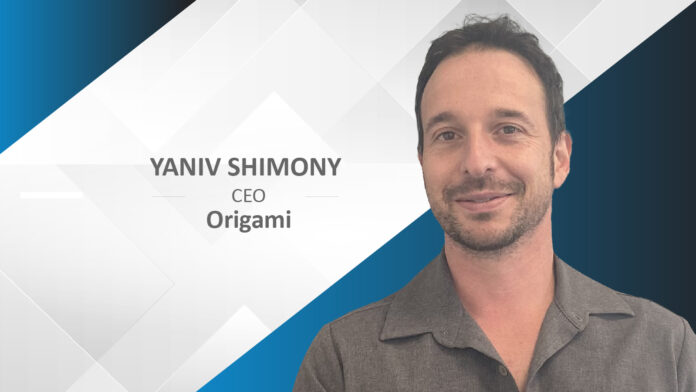
“Virtualization, cloud, and digitization technologies are enabling infinite new service opportunities for many companies. These technologies have also created strong competitive pressures that customers now expect to have immediate access to services and support overall available communication channels.” – Says Yaniv Shimony, CEO at Origami, in an exclusive interview with TalkCMO.
TCMO Bureau: Why are most enterprises globally struggling to keep up with rapidly changing market demands and constantly increasing customer expectations? What, according to you, is the biggest factor in helping them through this situation?
Yaniv Shimony: The service landscape is rapidly changing on an almost daily basis. Therefore more service and business processes are moving to the cloud and becoming virtualized and automated. In parallel, the realities of social distancing and remote work mandates have fast-tracked the rollout of enterprise digitization projects.
These trends can be felt in many vertical markets, especially in banking, insurance, other financial service sectors, and the healthcare and communications spaces. The government sector is another vertical that is currently digitizing rapidly and making more services available online and through mobile applications.
Virtualization, cloud, and digitization technologies are enabling infinite new service opportunities for many companies. These technologies have also created strong competitive pressures that customers now expect to have immediate access to services and support overall available communication channels.
Which businesses and organizations will succeed in this rapidly changing environment? The modern enterprises that maintain the flexibility to adjust their business and support processes efficiently will be in a stronger position to continue to thrive.
This process begins with CRM, although it also includes service delivery, billing, support, and all other interaction points with customers. For an enterprise to be considered modern, its technology infrastructure must serve as a growth engine to continually provide high-end customer service, attract new business, and pursue new revenue-generating market opportunities.
Alternatively, those enterprises that rely on outdated business infrastructure will fall behind. These types of organizations typically use software that is time-consuming to customize initially and expensive to configure on an ongoing basis. The outcome is often that these organizations are running their business processes according to the functional limitations of the software they have in place rather than using technology to serve their customers better and grow their businesses.
TCMO Bureau: Why leveraging new technologies is so crucial for creating a modern CRM operation?
Yaniv Shimony: Business processes and customer interactions can be leveraged as a competitive advantage in many sectors. This is especially true in many markets where the product or service itself has become a commodity. The difference among alternative suppliers is how the product or service is packaged, delivered, and supported.
The market for telecommunications services and many utility services are tangible examples of this. Many service providers in these markets use transparent billing processes as competitive differentiators and elaborate pricing schemes for cross-product packages and volume discounts to attract customers.
The online retail space is another example where processes for customer service, billing, and shipping are being used to create competitive advantages. For CRM to be leveraged as a competitive advantage to attract new business and maintain loyal customers, an enterprise must be in the position to adjust business and support processes at any time efficiently.
Enterprises should be able to implement ideas for new products and services into their CRM processes in a matter of hours. The same goes for creating new communication channels with customers, like adding social networks or messaging applications to CRM processes.
Those enterprises that still rely on their technology vendors for outdated change requests take months to design, code, and the test will undoubtedly lose market share and miss out on new revenue-generating market opportunities compared to enterprises that keep up with the pace of digital innovations within enterprise applications.
TCMO Bureau: How can enterprises position their CRM operations for ongoing changes that support business growth without the need for expensive and time-consuming code?
Yaniv Shimony: When software dedicated to CRM first became available two to three decades ago, most packages contained rigid functionality and limited integration capabilities. These initial CRM software packages were impossible to customize to the specific business requirements of end-user organizations.
With time, cloud-based CRM packages became widely available. This new generation of CRM packages made off-the-shelf functionality readily available from any web browser at lower monthly service costs.
Despite these advances, most cloud-based CRM packages remain difficult to customize and often include limited configuration options. Any customizations typically require extensive and expensive coding efforts that can take months to complete. The result is that users still need to adjust their business processes to the CRM functionality limitations.
One of our goals as a company is to enable enterprises to avoid these existing practices of long implementations and complex modification processes for CRM and other enterprise information systems. We empower users to build enterprise-grade applications, such as CRM, with automated processes and workflows without writing a single line of code.
TCMO Bureau: Do you agree that the pandemic has transformed the face of customer relationship management? If yes, how can enterprises future-proof themselves?
Yaniv Shimony: Yes, this is absolutely correct. Social distancing requirements have forced enterprises to transform to distributed operations rapidly. For example, today, it is common for call center staff to work from their homes, which will likely be the norm for the probable future. CRM processes and call center functionalities will need to accommodate our new reality quickly.
Also, as an outcome of the pandemic, the flow of customer interactions will likely continue to gain momentum on social networks, mobile apps, and messaging apps. Imperatively, enterprises will need to be in the position to quickly incorporate these new communication channels in their CRM processes and applications.
Html code here! Replace this with any non empty text and that's it.
Yaniv Shimony is the founder and CEO of Origami. Yaniv is the driving force behind Origami’s no-code, design-only development platform and is currently leading the company’s global expansion. He is an expert in designing and implementing modern enterprise information systems for prominent businesses and organizations worldwide.







